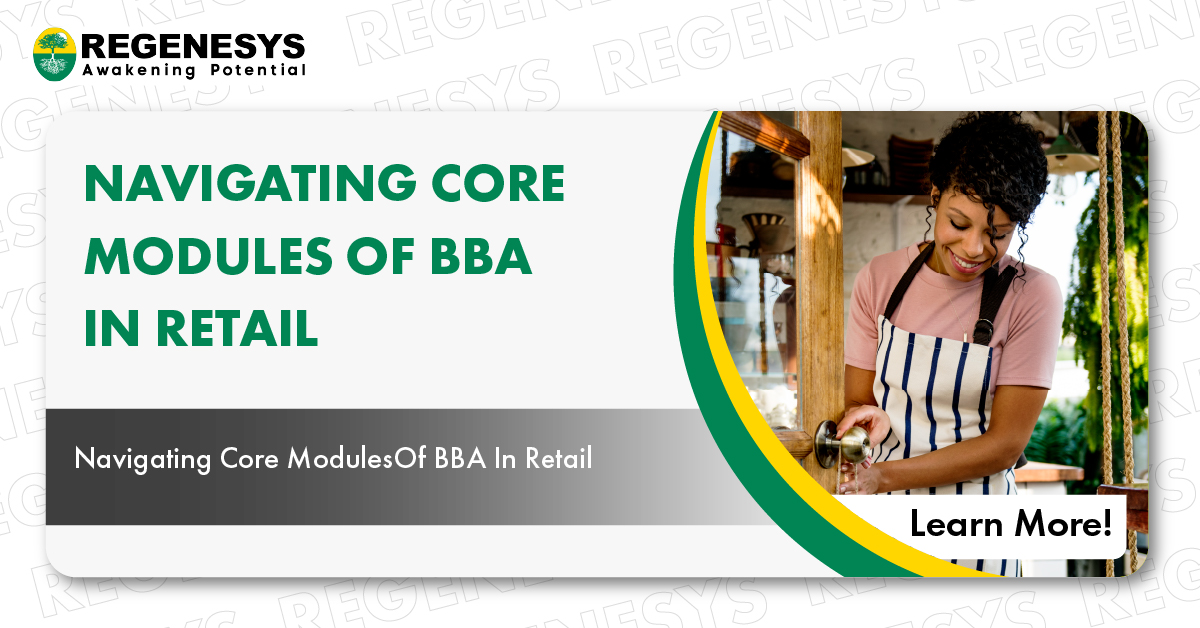A Bachelor’s degree in Retail Management focuses on essential strategies and operations for success in the retail sector. Students learn about inventory management, consumer behaviour, marketing, and financial management, which are directly applicable to real-world situations. Efficient inventory management, predicting consumer trends, effective marketing campaigns, and financial sustainability are key skills needed for success in retail. When students have a good grasp of these fundamental subjects, they are armed with the hands-on knowledge necessary to succeed in different positions in the retail industry. This article thoroughly explains BBA Retail Management core curriculum and real-world applications. Let’s delve into the fundamentals of Retail Management.
Table of Contents
What Is BBA In Retail Management?
A Bachelor of Business Administration degree in Retail Management is a focused programme for students aiming for leadership positions in the retail industry. It covers essential business skills along with knowledge of retail operations, marketing strategies, and consumer behaviour, helping students gain a comprehensive understanding of the field. By blending theoretical learning, practical training, and real-world exposure, students develop the skills to address retail issues and leverage potential opportunities.
By earning a Bachelor of Business Administration in Retailing, you can explore a wide range of career options within the retail industry, which is experiencing significant transformations from technological advancements and changing consumer behaviours. Graduates of this programme are equipped with the skills needed to lead teams, foster customer connections, and navigate the ever-evolving retail environment. Employers highly value the combination of knowledge, expertise, and flexibility that comes with a degree in Retail Management, making it a valuable asset for those aiming to excel in this fast-paced industry.
For a detailed overview, read: What is a BBA in retailing?
The Core Modules Of BBA In Retail
While pursuing a Bachelor of Business Administration (BBA) in Retail Management, students will come across various key modules that lay the groundwork for their knowledge and proficiency in the retail field. BBA Retail Management Subjects act as a stepping stone, offering valuable insights and skills to thrive in this fast-paced industry.
Economics
In this BBA in Retailing subject, students will learn basic economic concepts and how they are used in the retail industry. Subjects covered may include the relationship between supply and demand, different types of markets, methods for setting prices, and how economic conditions influence consumer behaviour and retail business practices.
Financial Management
Financial management plays a vital role in retail’s day-to-day operations. This system focuses on key financial principles, including budgeting, forecasting, analysing financial data, and making investment choices tailored to the retail sector. Participants will learn to understand financial records, oversee budgets, and assess potential investments to guarantee long-term success and viability.
Personal Mastery
Personal mastery aims to enhance student’s personal and professional abilities necessary to thrive in the retail sector. This subject covers areas like leadership growth, effective communication, time organisation, and emotional understanding. Students master leveraging their strengths, handling conflicts, and adjusting to evolving job settings.
People Management
People management is crucial in retail operations. This module delves into different aspects of human resource management specific to retail, such as recruitment, training, performance evaluation, and employee motivation. Students will discover techniques for creating and supervising effective teams, promoting a favourable work environment, and addressing conflicts that may arise in retail.
Information Communication Technology
Technology is crucial in retail management today. This module examines how information technology systems are used to manage inventory, track sales, manage customer relationships, and operate e-commerce platforms. Students will get practical experience using software designed for retail and learn how to use technology to improve efficiency and enhance the customer’s shopping experience.
Retail Management
In this essential component, you will thoroughly understand the fundamentals of retail management. We will cover various aspects such as different types of retail establishments, designing an effective store layout, planning merchandise, managing inventory, and overseeing the supply chain. You will also learn to interpret market trends, recognise customer preferences, and create plans to enhance retail efficiency and increase sales.
Retail Marketing
Marketing is crucial for attracting and keeping customers in the retail sector. This section delves into various marketing ideas and tactics customised for retail, including branding, advertising, pricing, and customer segmentation. Students will gain insights into developing successful marketing campaigns, using digital marketing platforms, and evaluating the effectiveness of retail marketing strategies.
Retail Strategic Management
In the retail sector, having a solid strategic management approach is crucial for maintaining a competitive edge. This subject focuses on analysing, forming, and executing strategies specifically tailored for retail businesses. Through this module, students gain insights into evaluating market trends, studying rival companies, spotting strategic openings, and creating effective plans to reach lasting business goals.
In these modules, students studying Retail Management BBA acquire a wide range of knowledge that covers economics, finance, personal growth, managing people, technology, operations, marketing, and strategic management. This prepares them to effectively navigate the ever-changing retail industry.
Also read: Navigating Your Future? Let’s unravel the Distinction Between BBA and BBA Retail Management.
Conclusion
A Bachelor of Business Administration (BBA) in Retail Management provides a comprehensive education that combines theoretical learning with hands-on experience, preparing individuals for a wide range of job prospects within the retail sector. Through a thorough understanding of key economics, finance, leadership, and marketing principles, graduates are well-prepared to manage retail operations effectively, enhance company performance, and provide top-notch service to consumers. Having a strong grasp of retail management principles and a focus on strategy and innovation, BBA graduates are equipped to succeed in positions within various retail industries, including traditional stores and online platforms. The knowledge gained from a BBA in Retail Management is essential for shaping the future of retail businesses on a global scale as the industry continues to grow and change.
Enrich your career in retail with Regenesys Business School’s Bachelor of Business Administration in Retail Management. Acquire the necessary strategic knowledge and hands-on skills to succeed in the constantly changing retail industry. Sign up now to unlock your full potential!
Frequently Asked Questions (FAQs) – The Core Curriculum of a BBA in Retail Management Programme
Q1. What is BBA in Retail Management, and what does it entail?
A Bachelor of Business Administration (BBA) in Retail Management is a specialised undergraduate degree programme that focuses on the principles and practices of managing retail businesses effectively. The programme entails modules on retail operations, merchandising, inventory management, consumer behaviour, and retail-specific marketing strategies.
Q2. What skills are emphasised and developed in a BBA Retail Management programme?
The programme focuses on teaching key skills needed for a career in retail management, such as strategic planning, sales strategies, building customer relationships, leadership, problem-solving, and data analysis. Students are also urged to improve their communication, interpersonal, and adaptive abilities to keep up with market changes and technological advancements.
Q3. Which colleges or universities offer BBA Retail Management programmes, and what are the Bachelor of Business Administration admission details?
Numerous colleges worldwide, such as Regenesys Business School, offer BBA programmes in retail management. These programmes help prepare students to become future leaders by teaching them skills like analysing consumer behaviour, managing supply chains, creating effective marketing strategies, and achieving operational excellence. Upon graduation, students are well-equipped to excel in the retail industry.
Admission prerequisites for Regenesys Business School’s BBA programme are:
A Matric with a Bachelor’s pass or an equivalent NQF level 4 qualification.
Or a relevant NQF Level 5 qualification from an accredited institution as required by SAQA.
Basic computer skills are required.
Q4. What career opportunities are available to graduates with a BBA in Retail Management?
Individuals who have completed a Bachelor of Business Administration degree in Retail Management are prepared for a wide range of job possibilities within the retail field. These may include positions like managing a retail store, overseeing merchandise, leading sales teams, coordinating marketing campaigns, analysing supply chains, or specialising in retail operations. Some graduates may even decide to start their own retail ventures or consulting firms. This degree offers a strong base for pursuing various careers in the ever-evolving retail industry.
Q5. How does a BBA in Retailing differ from a BBA?
A Bachelor of Business Administration (BBA) in Retailing has a specialised focus on managing retail businesses, unlike a general BBA, which provides a broader understanding of business principles. A BBA in Retailing goes into detail on topics like merchandising, inventory management, and consumer behaviour within the retail sector. Graduates of this programme are well-equipped for careers in the retail industry with a unique skill set tailored for retail management.







